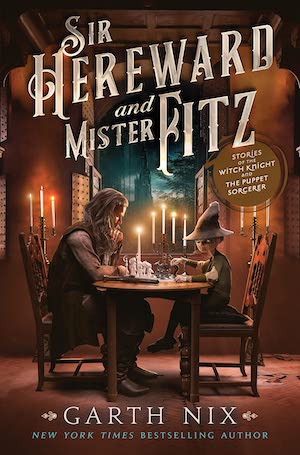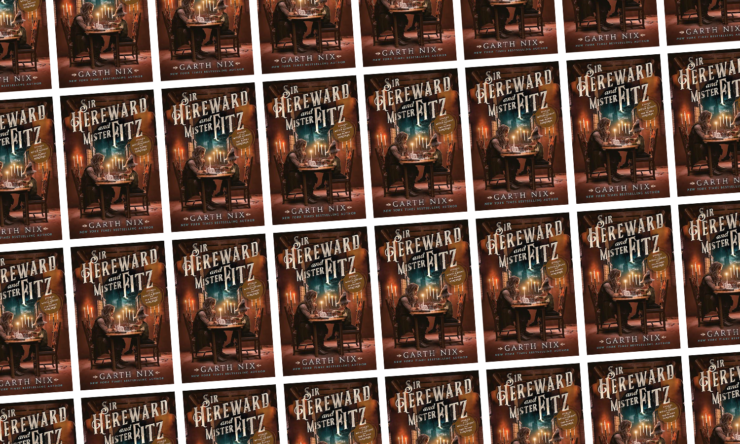It’s nice, sometimes, to find a book that wears its heart—and its influences—openly on its sleeve. Garth Nix’s first collection of stories for adults brings together his eight existing stories about the witch knight Sir Hereward and his intriguing companion, the puppet Mister Fitz. In his introduction, Nix cites “some obvious ancestors” which include Cervantes, Leiber, Stevenson, Dumas, and Burroughs, which plainly puts a reader in a certain kind of sword-and-sorcery territory—though perhaps that territory does not regularly involve sentient puppets.
Mister Fitz is no ordinary wooden boy, even for his own world, where magical entertainment puppets are common. Mister Fitz carries about a sewing desk that is not exactly a sewing desk, and as for Sir Hereward, he’s no common artillerist, either.
These two are in a business that might most simply be described as slaying gods.
But Nix is too artful and too imaginative to go with just plain old god-slaying, though plenty of that does happen. The first story, “Sir Hereward and Mister Fitz Go to War Again” (don’t overlook the “again,” which gives the whole thing an oddly endearing resigned-ness) begins with a question: “Do you ever wonder about the nature of the world, Mister Fitz?” The ever-practical puppet replies, “I take it much as it presents itself, for good or ill, Mister Hereward.”
And so they do: Hereward wonders, wanders, gets into trouble of the magical sort, and tries to get himself into trouble of the romantic sort. Mister Fitz handles, explains, educates, and, occasionally, cockblocks. (There’s really no better word for it.) They are a delightful odd couple on a seemingly endless road trip across a world that is nicely mapped in the opening pages, though I found I did not often refer to the map: Our protagonists went somewhere weird, then somewhere else weird, and where one place was in relation to the other did not really matter. What mattered was who or what else was there with them.
Buy the Book


Sir Hereward and Mister Fitz
Leave it to Nix—whose Old Kingdom is one of my favorite fantastical realms to revisit—to invent for a short story (which led to more stories, thankfully) a world in which interdimensional entities intrude and are perceived as gods. Many of them are proscribed, and those are the ones with which Hereward and Fitz are especially concerned. The pair are agents of the Council of the Treaty for the Safety of the World, and when they encounter proscribed gods they have an even longer series of words that must be recited before they engage. Also, the duo are just straight-up oddballs even in their line of work, given that Hereward is the only boy-child in a line of female witches and Fitz is, well, a puppet. (Also a puppet that doesn’t worry much about gender; he used to be Mistress Fitz, and now he is not. No big deal.)
Some godlets are nice, and do good things for their towns or regions. Others are less so. They can be quite hungry. Hereward tends to deal with their human agents, while Fitz whips an “esoteric needle” out of his sewing desk and does something that humans cannot observe without great damage to their sense of sight. It sounds simple enough, but Nix invents ever more complex scenarios, one of which involves a very large mortar shell and a very violent, very large starfish. One god covers our heroes with endless snow. There’s a very small dragon. And we haven’t even gotten to the woman who is also a leopard.
There is so much to be curious about in this world, including Hereward’s endless array of aunts and other relatives (not all of which find him as charming as I do) and Nix’s wide world of towns that are full of comely captains of the guard and pirates and mystical sisterhoods. I want to know everything about the council, the luxuriously named gods (“Forjill-Um-Uthrux,” for one), the tantalizing blend of magic and interdimensional elements that create a world of swords and almost science-fictional godlets—and I also just want to wander around with our heroes as they narrowly save the day.
I do wish, though, that they didn’t murder quite so many women in the process. The first few stories in this collection take out a whole laundry list of interesting women, and while generally, many people tend to die when Fitz and Hereward are around, it starts to feel a bit tipped in one direction by the time we get to “Home is the Haunter,” the sixth story. Among those who survive the tales are a nice young woman who finds herself naked after being impersonated by a troubling entity, and one woman who (wisely) walks away from a flirtation with Hereward, but more than a few others end up toast (at least the teenager Hereward shoots survives). I would quite like to see Hereward faced with a woman who can more than match wits with him, preferably for the entire duration of a story in which she does not meet a terrible fate (or succumb to his clumsy seductions). But perhaps this is all just an indication of our boy’s terrible luck in love (and less heartfelt connections).
For all the rollicking adventuring, there’s a serious streak that runs through these stories, both in terms of what all the killing and conflict does to Hereward and Fitz, and in the role the godlets (and the council, and lord knows what other authorities) play in this world. Some towns are more or less free than others; the power imbalances are countless, shifty, leaving humans dependent on their benevolent entities—and in deep trouble when said entities die. Some of the gods wreak environmental havoc, and some hoard wealth, and for all the magic involved, these problems can feel quite familiar.
The whole concept of these tales is a sort of constant scale balancing: Who has power, and what kind of power, and how is it best used? The answer is not always bloodless, which feels… accurate, if not “right,” exactly. Faced with a more morally complex situation (in the one new story, “The Field of the Fallen Foe”), Mister Fitz asserts a strong moral position—one that challenges the seeming straightforwardness of their work, and of their employers. The world Nix has built here—and the layered, wonderful relationship between Hereward and Fitz—feels as if it has only begun to be explored, and one can only hope he finds reason to return to it.
Sir Hereward and Mister Fitz is published by Harper Voyager.
Read an excerpt.
Molly Templeton lives and writes in Oregon, and spends as much time as possible in the woods. Sometimes she talks about books on Twitter.











I haven’t read Nix before, but I recently stumbled across this collection, and it is EXACTLY the sort of thing I’m into. Pike & shot era swords and sorcery is entirely too fun.
I’m only four or five stories into the collection so far, but I’ll agree with you on the excessive amount of dead women. It hits a little differently as a recurring theme in a collection, as opposed to a bunch of individual stories stretched out over various magazines and anthologies and such. But at least Nix is better when it comes to female characters than Lieber was? Which, uh, is a RIDICULOUSLY low bar, but still. I honestly can’t go back to the old Fafhrd & Grey Mouser stories after having read “The Knight & Knave of Swords,” which was just gross and pointless in its horniness. Oof.